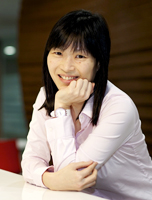While quality improvement (QI) is not new, Dr Low Su Ying and team are working on providing a more structured QI framework for clinicians.
While quality improvement (QI) is not new, Dr Low Su Ying and team are working on providing a more structured QI framework for clinicians, Medicine ACP’s Dr Low Su Ying, Director for Quality Improvement and Implementation, is one of the key drivers of Quality Improvement (QI) projects for clinicians. Her team is looking into providing a formal platform for all levels of clinicians to work on QI projects together or with other staff.
Said Dr Low, “As pointed out by one of our Senior Residents, QI can be as simple as turning a pet peeve into a solution. One that ultimately leads to a better quality of care for patients.
"The size of a QI project does not matter. What matters is whether it is doable, sustainable and leads to improvement.”
A doctor’s key contribution to QI is his medical knowledge and input for medically-related aspects of care. “Doctors know best how a change will impact on patient’s care.”
Dr Low acknowledged that some doctors may feel that to be involved in QI means that they have to learn new tools and methodology which they have no time for. “Support for doctors is provided by our administrative staff and other colleagues who are equipped with QI 'know-how'.”
She hopes that providing clinicians a structured framework and support will make QI conducive for all levels of clinicians and staff to practice, apply, and be drivers of change.
“Quality improvement can be as simple as turning a pet peeve into a solution. One that ultimately leads to a better quality of care for patients.” – Dr Low Su Ying, Director for Quality Improvement and Implementation under Medicine ACP, SGH.
|  |
The ACP’s Academic Chair Associate Professor Chow Wan Cheng and Vice Chair Associate Professor Wong Kok Seng started the movement by including QI as part of Clinical Services in the Residency curriculum.
“We now have a new generation of doctors who are taught and familiar with QI concepts,” said Dr Low.
At the same time, senior clinicians are being equipped systematically to lead innovation and improvement projects and to serve as mentor to the Residents.
While a small change leading to a big improvement can bring a lot of satisfaction, not every initiative will be successful and clinicians should not be disheartened.
Perseverance will eventually lead to improvement through behaviour and cultural change, maintained Dr Low.
Dr Low revealed that more plans are in the pipeline to help clinicians undertake QI projects easily, such as a dashboard framework to match different levels of clinicians with common QI interest. “We hope to create a whole new environment that embraces QI.”
Academic Chair Prof Chow had this to say, “QI or clinical service improvement projects make immediate difference to patient safety and quality of care. As a result, our clinicians feel more inspired and empowered.”
Electronic Handover Project
A “pet peeve” that benefitted from the QI involvement of clinicians in the Medicine ACP is the Electronic Handover process. The improvement resulted in the Medical Board approving it for implementation in all the medical wards in SGH.
The Electronic Handover System provides a standardised method of handover from ward doctor to the on-call doctor on the Electronic Medical Records software platform, thus ensuring efficient continued care for the patient.
Although in place since March 2012, usage of the Electronic Handover System was low. Clinicians continued to rely on the old method of verbal handovers over the telephone.
Internal Medicine residents took on the system as two QI projects.
By focusing on helping clinicians use the handover tools correctly and seeking their feedback on how to improve the system framework, the QI teams increased compliance rates of using the electronic system, as well as improved the information processing and hence quality of the handovers.
Both projects were presented as posters at the prestigious Institute for Healthcare Conference held in Florida, USA in December 2014.
“Handover is something that doctors do every day. Hence seeing the difference the QI project made was something very tangible to us,” said one of the resident team leads, Dr Sharifah Munirah Binte Abdullah Alhamid.
"Just like everyone has their specialty of interest, there will be pet peeves that we can transform into very well meaning and practical projects. QI is definitely desirable. Feasibility is up to us!,” said Dr Orlanda Goh, who led the other resident team.
